current location: Home> Central News
Central News
The Peking University 2024 Rural Revitalization Forum was held.
Release date:2024/11/12 Source: CCAP
To thoroughly implement the spirit of the Third Plenary Session of the 20th CPC Central Committee, deepen rural reform comprehensively, and accelerate the modernization of agriculture and rural areas, the Peking University 2024 Rural Revitalization Forum was held at the Qiulin Lecture Hall of Peking University on November 9, 2024. The forum, hosted by Institute of New Rural Development and School of Advanced Agricultural Sciences and co-organized by China Center for Agricultural Policy, Peking University, centered on the theme "Comprehensively Deepen Rural Reform and Promote Agricultural and Rural Modernization." The event included an opening ceremony, keynote speeches, and a series of roundtable forums. Over 300 representatives from 163 universities, research institutions, government departments, and enterprises nationwide, including the Ministry of Agriculture and Rural Affairs, Peking University, China Agricultural University, the Chinese Academy of Social Sciences, and COFCO Group, attended the forum. Additionally, more than 6.37 million people participated online through live streaming platforms.

Guests attending the forum included Xiwen Chen, former Director of the Office of the Central Leading Group for Rural Affairs and member of the Standing Committee of the 13th National People’s Congress as well as a member of the Agriculture and Rural Affairs Committee; Zhiyong Dong, Member of the Standing Committee of the Party Committee and Vice President of Peking University; Lejun Wang, Chief Veterinarian of the Ministry of Agriculture and Rural Affairs; and Houkai Wei , Member of the Academic Division of the Chinese Academy of Social Sciences and Director of the Rural Development Institute. The opening ceremony was presided over by Jikun Huang , Dean of the School of Advanced Agricultural Sciences and Director of the Institute of New Rural Development, Peking University.
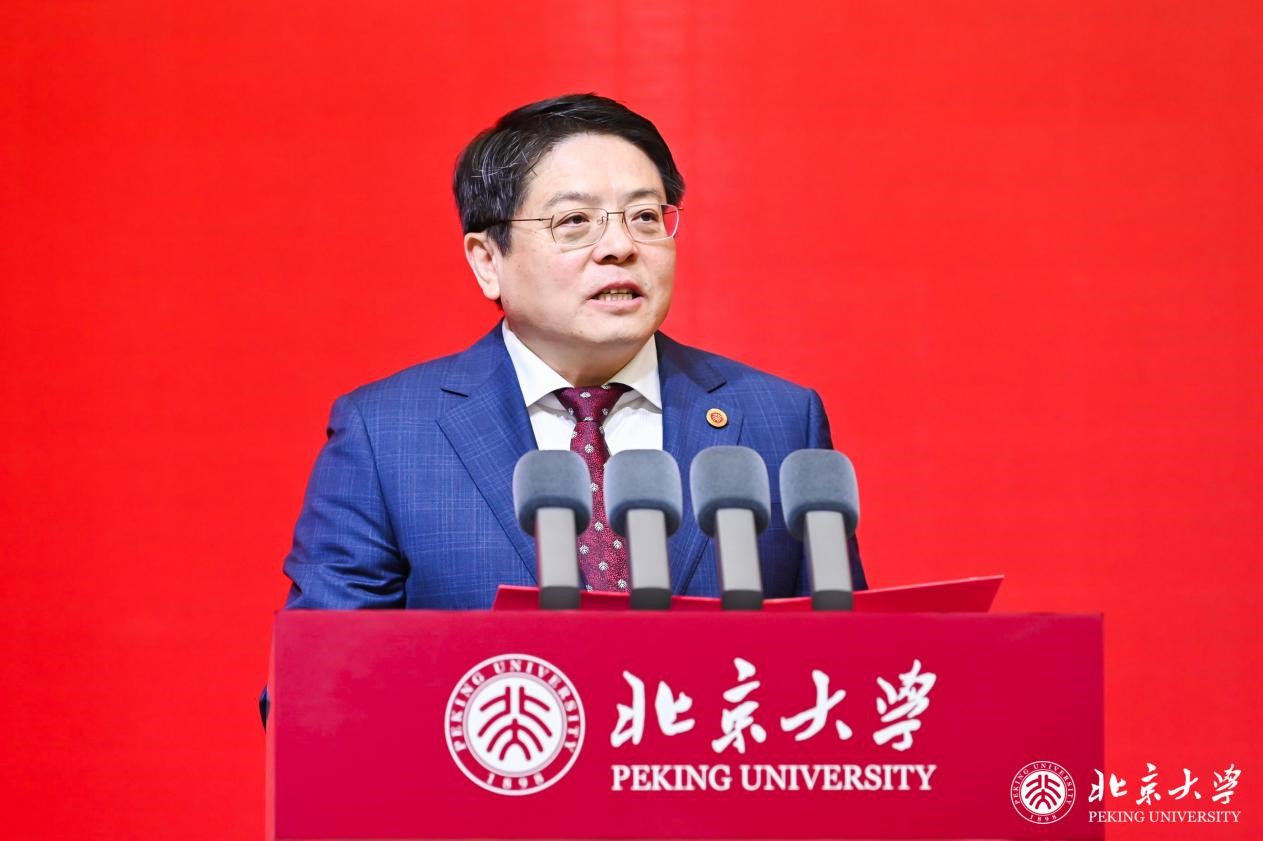
During the opening ceremony, Zhiyong Dong delivered a speech, extending a warm welcome to all the guests and experts on behalf of Peking University. He emphasized that research and practice in the field of rural revitalization currently hold unprecedented prospects and a significant mission. Dong expressed hope that the Institute of New Rural Development would seize the pulse of the times and shoulder historical responsibilities, leading policy innovation through higher-level interdisciplinary research and establishing a globally influential think tank platform. He also called on experts and scholars at the forum to share experiences and exchange ideas, providing innovative perspectives and practical suggestions to advance rural revitalization and agricultural modernization, further promoting the implementation of the national rural revitalization strategy.

At the opening ceremony, Lejun Wang delivered a speech, congratulating the forum on behalf of the Ministry of Agriculture and Rural Affairs and expressing gratitude for the longstanding support from various sectors for agricultural and rural work. He emphasized the need to continue implementing the decisions and plans of the CPC Central Committee, focusing on deepening reforms in key areas of agriculture and rural development, consolidating and improving the basic rural operational system, and upholding the priority of agricultural and rural development. Wang also called on all sectors of society to work together, using the forum as a platform to share achievements, solve challenges, and contribute to deepening rural reform and advancing comprehensive rural revitalization.
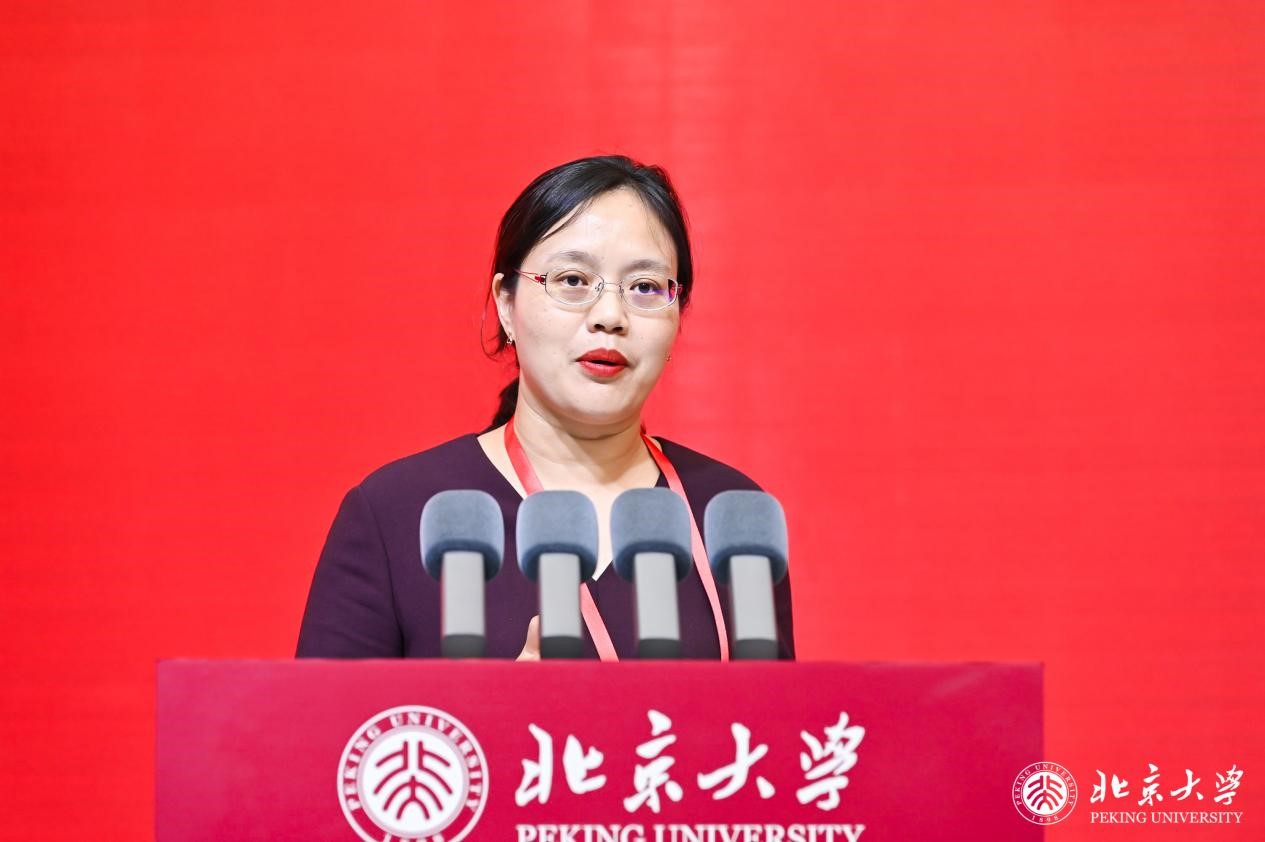
The keynote report session was chaired by Hongmei Yi, Professor at the School of Advanced Agricultural Sciences and Deputy Director of the Institute of New Rural Development at Peking University. Xiwen Chen, Houkai Wei, and Jikun Huang each delivered keynote speeches on major theoretical and policy issues, focusing on topics such as innovations in the rural land system, urban-rural integration development, and the institutional mechanisms for developing new productive forces in agriculture.
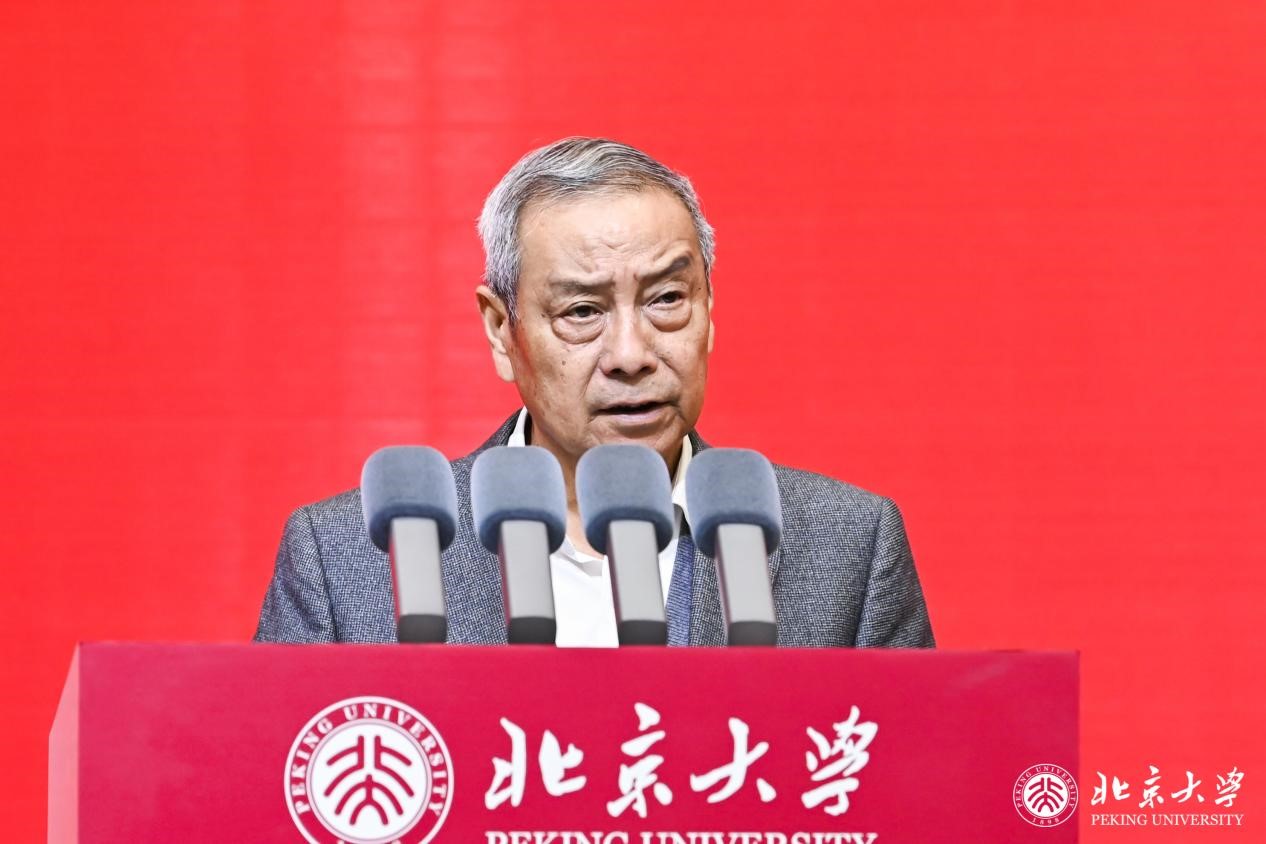
Xiwen Chen delivered a keynote report titled "Consolidating and Improving the Basic Rural Operational System," reviewing the historical evolution of this system and detailing its crucial role and future direction in the current agricultural modernization process. He emphasized that the basic rural operational system upholds the socialist nature of rural China, highlighting the need to persist with and refine this system to provide robust support for advancing agricultural modernization, promoting rural revitalization, and safeguarding farmers' rights. Chen concluded that this system lays a solid foundation for rural development and common prosperity in China.
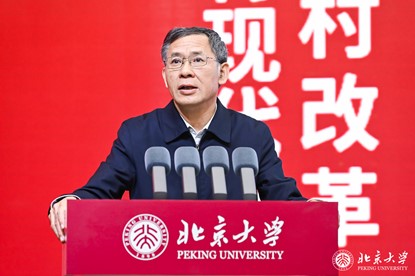
Houkai Wei delivered a keynote report titled "Institutional Mechanisms for Urban-Rural Integration Development in the New Era." He emphasized that promoting urban-rural integration through institutional and mechanism innovation is fundamental to advancing agricultural and rural modernization in China. Wei elaborated on the current status, challenges, and future reform directions for urban-rural integration in China, providing significant theoretical and practical guidance for urban-rural integration development in the new era.

Jikun Huang presented a report titled "Developing Agricultural New-Quality Productive Forces with Locally Appropriate Systems and Mechanisms." He stressed the importance of deeply understanding the concept of "new-quality productive forces" as proposed by General Secretary Xi Jinping, clarifying its connotation and extension to provide theoretical guidance for practical application. Huang highlighted that agriculture combines natural reproduction with economic reproduction, necessitating the establishment of systems and mechanisms suited to the development of new-quality agricultural products, production factors, and production methods tailored to local conditions.
During the roundtable forum, over 20 guest speakers engaged in discussions on four key topics: the broad perspective of food and agricultural development, green agricultural development and the low-carbon transition, digital technology and agricultural-industrial integration, and rural human capital and farmer development. The forums explored opportunities, challenges, and strategic approaches, providing in-depth insights to further rural revitalization.
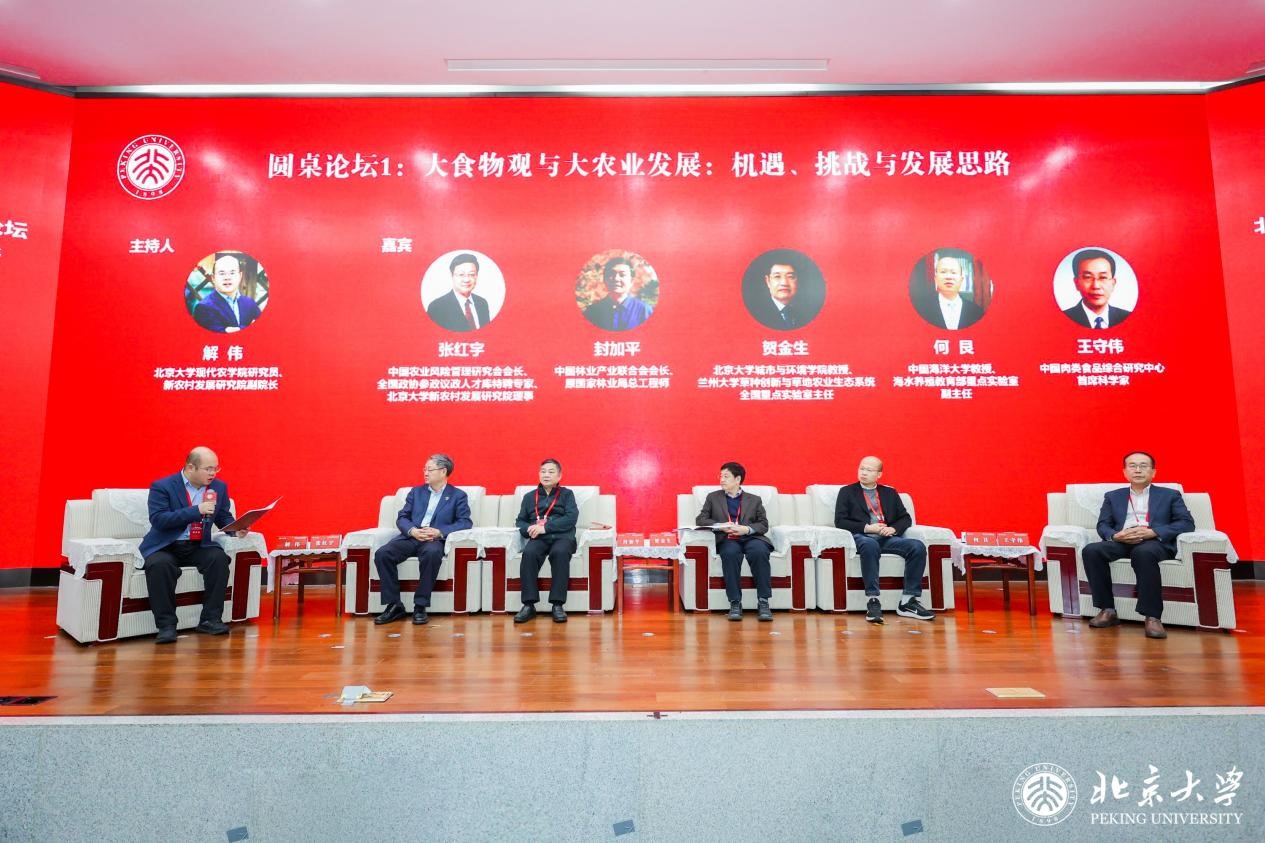
Roundtable Forum 1 focused on "Broad Food Perspective and Big Agriculture Development: Opportunities, Challenges, and Development Approaches," and was chaired by Wei Xie, Associate Professor at the School of Advanced Agricultural Sciences and Deputy Director of the Institute of New Rural Development, Peking University.
Participants included Hongyu Zhang, President of the China Agricultural Risk Management Association and specially-appointed expert in the CPPCC's talent pool for political consultation, who also serves as a board member of the Institute of New Rural Development at Peking University; Jiaping Feng, President of the China Forestry Industry Federation and former Chief Engineer of the State Forestry Administration; He Jinsheng, Professor at the College of Urban and Environmental Sciences at Peking University and Director of the National Key Laboratory of Grassland Innovation and Agro-Ecological Systems at Lanzhou University; Gen He, Professor and Deputy Director of the Key Laboratory of Marine Aquaculture of the Ministry of Education at Ocean University of China; and Shouwei Wang, Chief Scientist at the China Meat Research Center.
These panelists shared insights and engaged in discussions on the current status, potential, and challenges of five major food production systems: agricultural areas, grasslands, forests, marine areas, and future food sources.
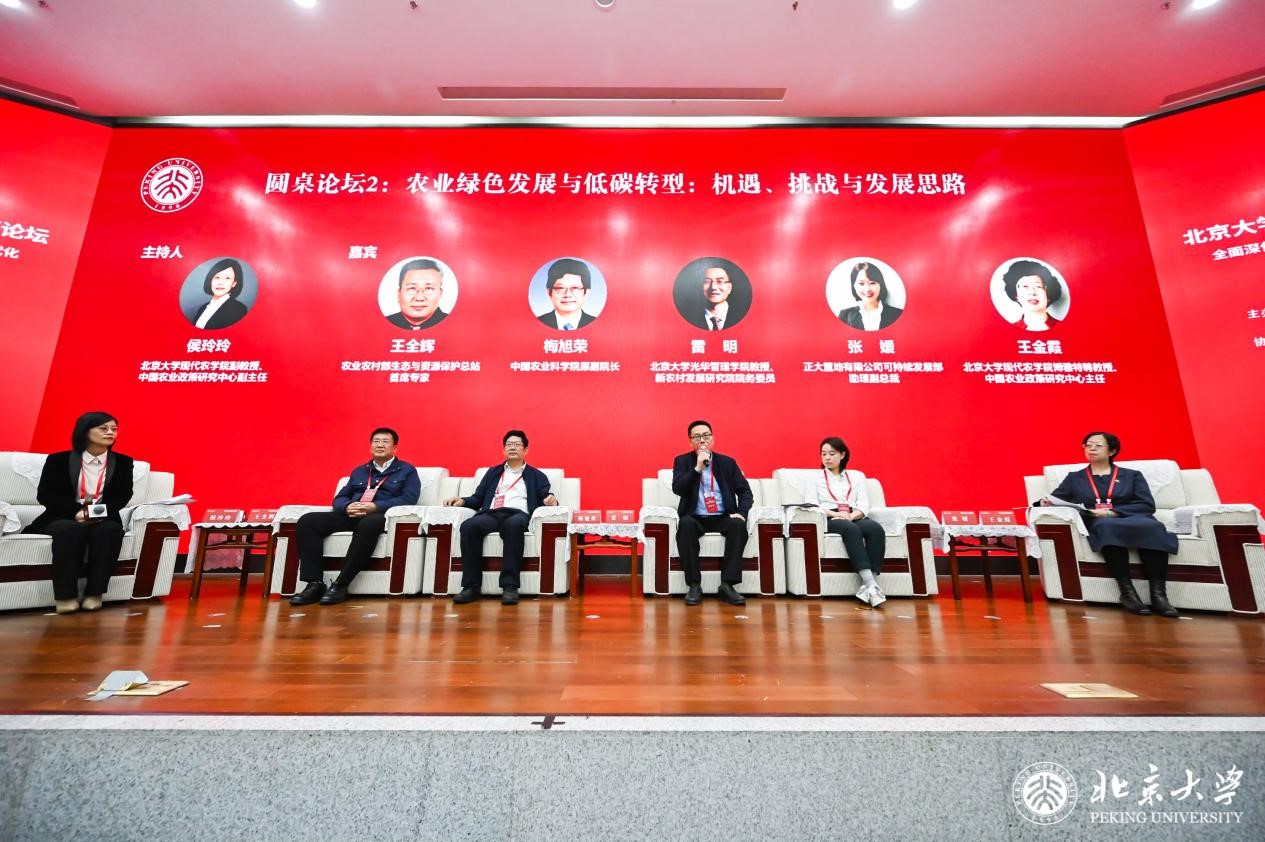
Roundtable Forum 2 was themed "Agricultural Green Development and Low-Carbon Transition: Opportunities, Challenges, and Development Approaches," chaired by Hou Lingling, Associate Professor at the School of Advanced Agricultural Sciences and Deputy Director of the China Center for Agricultural Policy, Peking University.
The forum featured prominent guests including Xurong Mei, former Vice President of the Chinese Academy of Agricultural Sciences; Quanhui Wang, Chief Expert at the Ministry of Agriculture and Rural Affairs' Station for Ecology and Resource Protection; Ming Leifrom Peking University's Guanghua School of Management; Yuan Zhang, Assistant Vice President of the Sustainable Development Department at Chia Tai Real Estate Co., Ltd.; and Jinxia Wang, Boya Distinguished Professor at the School of Advanced Agricultural Sciences and Director of the China Center Agricultural Policy, Peking University.
These panelists engaged in an in-depth discussion on development planning, policies, key technologies, practical experiences, and the primary opportunities and challenges facing green, low-carbon transformation in agriculture.
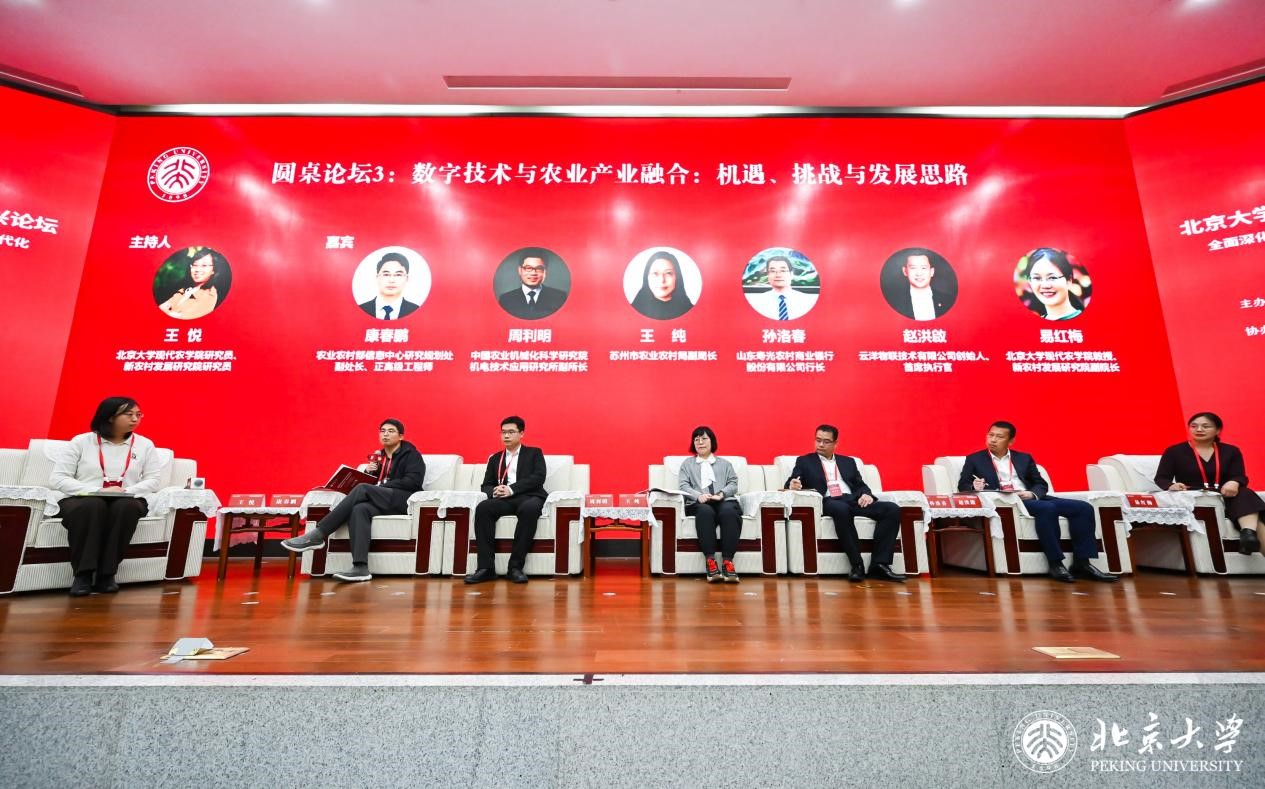
Roundtable Forum 3, themed "Digital Technology and Agricultural Industry Integration: Opportunities, Challenges, and Development Approaches," was chaired by Yue Wang, Research Fellow at the School of Advanced Agricultural Sciences and the Institute of New Rural Development, Peking University.
The forum brought together key speakers, including Chunpeng Kang, Deputy Director and Senior Engineer at the Research and Planning Office of the Ministry of Agriculture and Rural Affairs' Information Center; Liming Zhou, Deputy Director of the Mechatronics Technology Application Research Institute at the Chinese Academy of Agricultural Mechanization Sciences; Chun Wang, Deputy Director of the Suzhou Bureau of Agriculture and Rural Affairs; Luochun Sun, President of Shouguang Rural Commercial Bank Co., Ltd.; Hongqi Zhao, Founder and CEO of Yunyang IoT Technology Co., Ltd., an innovative enterprise in agricultural IoT; and Hongmei Yi, Professor at the School of Advanced Agricultural Sciences and Deputy Director of the Institute of New Rural Development, Peking University.
The panelists engaged in discussions on three main topics: demand-oriented digital technology products in agriculture and their cost-benefit considerations; issues related to the digital divide, inclusivity, and farmer welfare; and pathways for technological innovation and top-level design of institutional mechanisms.

Roundtable Forum 4, themed "Rural Human Capital and Farmer Development: Opportunities, Challenges, and Development Approaches," was chaired by Kaixing Huang, Research Fellow at the School of Advanced Agricultural Sciences and the Institute of New Rural Development, Peking University.
Esteemed guests included Xingqing Ye, former Director and Research Fellow of the Rural Economy Research Department at the Development Research Center of the State Council; Ruiming Liu, Party Secretary and Deputy Director of the Human Resources Development Center at the Ministry of Agriculture and Rural Affairs; Xiaoyun Li, Distinguished Professor at China Agricultural University; Yao Li, Hebei Provincial People's Congress Representative and Secretary of Kantian Village, Panggezhuang Township, Laoting County; and Chengfang Liu, Deputy Director of the School of Advanced Agricultural Sciences, Boya Distinguished Professor, and Deputy Director of the China Center Agricultural Policy, Peking University.
The panelists shared their practical experiences and research findings on rural human capital and farmer development issues, engaging in an in-depth discussion on these topics.
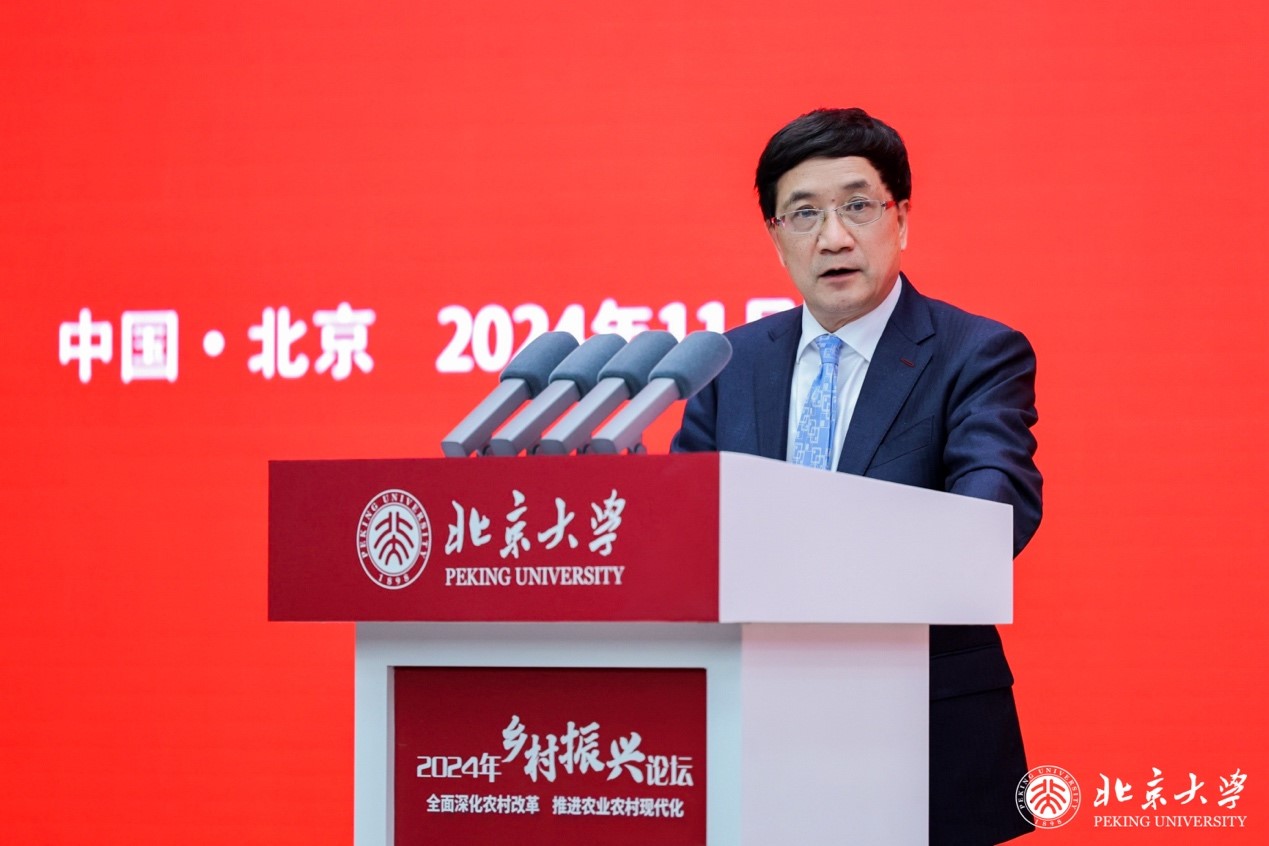
In the closing remarks, Jikun Huang expressed gratitude to the experts and scholars for their unique insights and innovative ideas shared during the forum. He noted that the forum provided an in-depth exploration of the critical role of reform and innovation in technology, institutions, policy, and investment in advancing agricultural and rural development, enhancing understanding across sectors of the importance of "comprehensively deepening rural reform and promoting Chinese-style modernization." Huang emphasized that the forum presented new ideas, perspectives, and insights in many areas related to rural reform and modernization, offering valuable references for further theoretical, policy, and practical research.
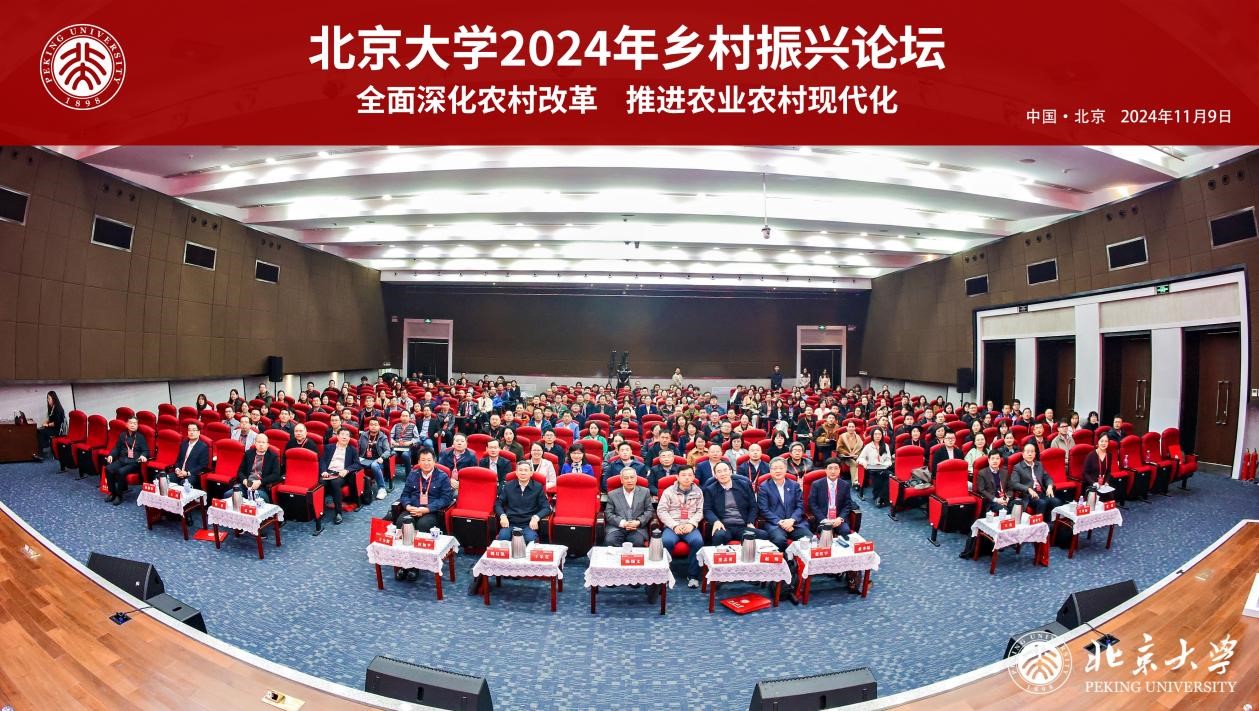



 Home
Home



